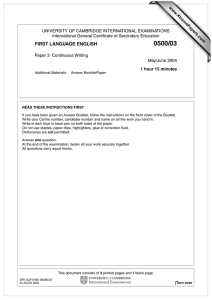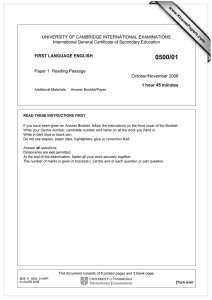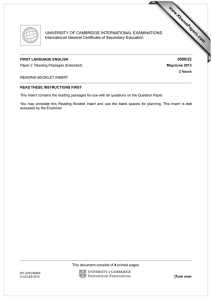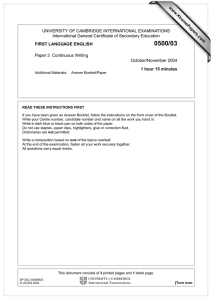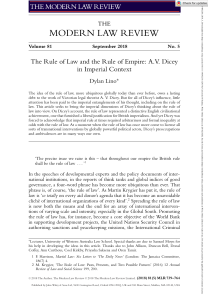www.XtremePapers.com
advertisement
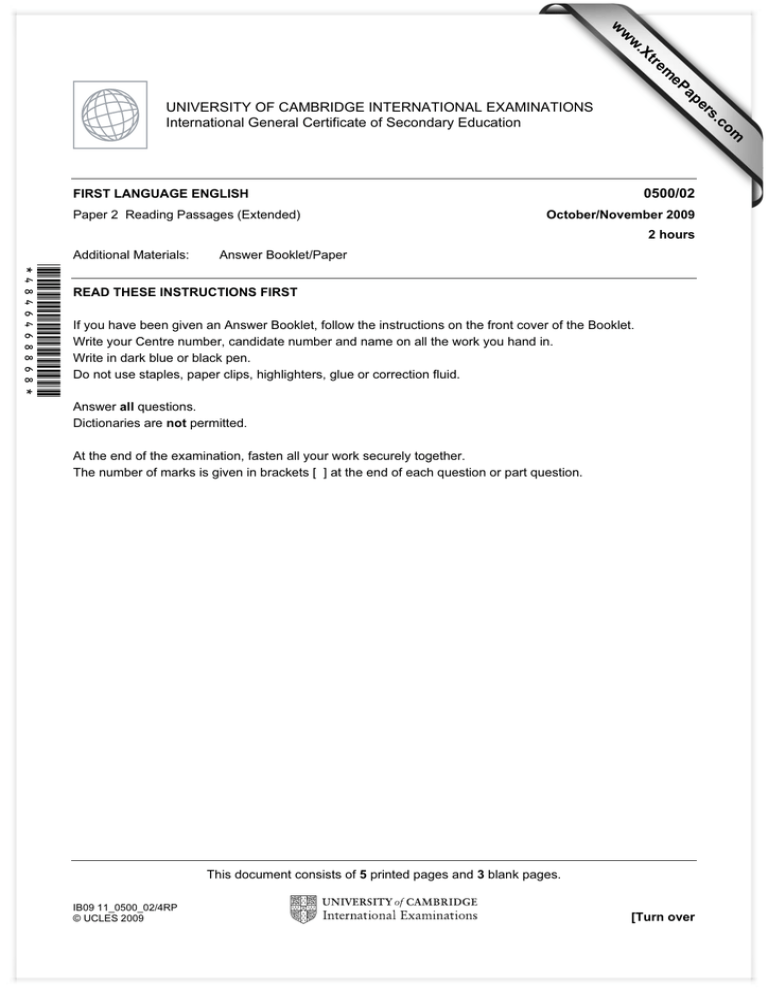
w w ap eP m e tr .X w om .c s er UNIVERSITY OF CAMBRIDGE INTERNATIONAL EXAMINATIONS International General Certificate of Secondary Education 0500/02 FIRST LANGUAGE ENGLISH Paper 2 Reading Passages (Extended) October/November 2009 2 hours Additional Materials: Answer Booklet/Paper *4846468868* READ THESE INSTRUCTIONS FIRST If you have been given an Answer Booklet, follow the instructions on the front cover of the Booklet. Write your Centre number, candidate number and name on all the work you hand in. Write in dark blue or black pen. Do not use staples, paper clips, highlighters, glue or correction fluid. Answer all questions. Dictionaries are not permitted. At the end of the examination, fasten all your work securely together. The number of marks is given in brackets [ ] at the end of each question or part question. This document consists of 5 printed pages and 3 blank pages. IB09 11_0500_02/4RP © UCLES 2009 [Turn over 2 Part 1 Read Passage A carefully, and then answer Questions 1 and 2. Passage A Order and disorder Ms Jhabvala entered the school compound as usual and sighed. She sighed because the buildings before her reminded her of a medieval fortress, not a school. They were cruel and forbidding. What had once been flowerbeds were now sandy deserts where poorly disciplined children threw soil in each other’s eyes. She sighed again as she passed through the creaking door of her daily prison, along the echoing, miserable passages, her footsteps the only sound in this place of torture. Now her mind clicked into action, rehearsing the last details of the lessons she was to teach today. Never mind the Principal’s ideas about learning, that children should choose what they wanted to do, that they should have freedom. Ms Jhabvala had heard the shouting and disorder from too many classrooms. She had seen the morose faces of sad children waiting to be taught but never able to make up their minds as to what might interest them. These classrooms were lifeless, without energy. Ms Jhabvala was the only person on the premises, except for the caretaker who was still unlocking doors. She always arrived early so that everything would be ready and she would be thoroughly prepared. She passed through Mr Raj’s room. It looked ransacked as if a wild beast had blundered through. Scattered tables and chairs and ripped papers littered the room and broken furniture was heaped into a mountain at the back. Ms Jhabvala stopped and looked at the symmetry of the ruin; ironic, she thought, that it was the most orderly thing in the room. The walls were pitted with holes and spattered with sticky substances. Not like mine, the teacher thought, thinking of her students’ neat work displayed in her bright, friendly classroom. But, as she reminded herself, no one cared. Like Mr Raj, they had all given up long ago. At last she arrived at her own room, a haven of peace and industry. She switched on the computers, checked the programs and put piles of textbooks on her table. Ten minutes later she looked out and saw hordes of children slouching into school, despondent, not caring much about anything. Some fights broke out, unnoticed by the few teachers who also drifted in, carrying their battered briefcases. Ms Jhabvala did not imagine that these contained anything except pens, pencils and a few snacks. The noise spread to the adjoining classrooms, and soon there were sounds of teachers trying to make themselves heard above the screams and coarse laughter. Ms Jhabvala opened the door to her neat line of beaming students. They wished each other good morning and Ms Jhabvala straightened a few stray bits of clothing, and the children filed quietly in. One of them had brought a wooden sign with ‘Ms Jhabvala, her special room’ painted on it to go on the outside of the door. The teacher took her own register (she was the only one to do so) and the lesson started. Forty minutes later, they had read a story, learned something about punctuation and language, and were busy writing poems that would decorate the wall before the end of the week. The brightest children were given special work to do. As they went, one little girl said, ‘I wish we could stay in your class all day. We have to go to Mr Raj now, and we never do anything.’ © UCLES 2009 0500/02/O/N/09 3 Ms Jhabvala paused a minute as they went, to think how hard it had been for her. When she first came to the school, no one had wanted to learn at all. But she had persevered, rewarding them for being positive or just pleasant. She’d hardly ever lost her temper, and had always managed a smile. The other teachers had given in to stupid ideas about teaching and the curriculum. Language and mathematics had been given little time and there were huge gaps in the children’s knowledge, about science, for example. There was a good deal of sport, though most of that was not about fitness. ‘They just loaf about,’ she thought. If you asked children what they wanted to do, they’d always say ‘Watch a DVD’, but after a time that bored them too. So the days were chaotic, and everyone lacked any sense of purpose. Soon they grew tired of each other’s company. Ms Jhabvala’s train of thought petered out at this point. Anyway her next class was waiting. She opened the door and proudly hung up her new wooden sign. 1 Imagine you are a schools inspector and you have recently visited the school described in Passage A. You are not pleased with what you have observed. Write your report, in which you: • outline and explain the reasons for your dissatisfaction; • make some recommendations to improve matters. Base your report on what you have read in Passage A. Support your ideas with evidence from the passage. Write between 1½ and 2 sides, allowing for the size of your handwriting. Up to fifteen marks will be available for the content of your answer, and up to five marks for the quality of your writing. [Total: 20] 2 Re-read the descriptions of: (a) the school and its surroundings in paragraph 1; (b) Mr Raj’s classroom in paragraph 3. Select words and phrases from these descriptions, and explain how the writer has created effects by using this language. [Total: 10] © UCLES 2009 0500/02/O/N/09 [Turn over 4 Part 2 Question 3 is based on both Passage A and Passage B. Read Passage B carefully, and re-read Passage A. Passage B The English lesson Dicey had an English textbook open in front of her and the teacher, Mr Chappelle, was introducing the next unit of study. They’d spent the first three weeks on learning grammar and now they were going to read some stories. Dicey was sorry the grammar had finished. She liked the precision of it. Besides, it was easy. ‘Conflict’ was written on the board in Mr Chappelle’s square printing. He couldn’t write in a straight line. He was young and skinny and had carroty red hair that he kept trying to brush flat with his hands, but it always popped back. He had a pale face: pale blue eyes, pale skin, even his freckles were pale brown. He was one of those teachers who taught standing up, but he didn’t move around much, just stood in front of the blackboard. He always rolled a piece of chalk in his fingers. On the first day of class he had introduced himself as the English and Drama teacher. In Dicey’s opinion he wasn’t very dramatic. ‘If we define conflict as requiring two opposing forces, what might we look for?’ he asked the class. ‘For how conflict might appear,’ he added. ‘In what forms,’ he added. ‘In a story,’ he added. Nobody sat near Dicey, who sat alone. She scratched at the shoulder of her T-shirt and waited to hear how stupid the answers to the question would be. There was only one other person in the class who thought of interesting answers and that was a girl who sat in the front row, diagonally across from Dicey. This girl usually waited until all the stupid guesses had been made before she raised her hand. Dicey never raised her hand, but if Mr Chappelle asked her she’d answer. Dicey leaned back and waited to see what the answers to Mr Chappelle’s question would be. ‘Conflict between two men,’ they began. Mr Chappelle wrote ‘two men’ on the board. Since it was correct, a whole lot of hands went up. ‘A woman and a woman.’ ‘A man and a woman?’ ‘A boy and a boy?’ ‘A girl and a girl?’ The predictable list went on. Mr Chappelle wrote everything on the board. Dicey made her own list inside her head, because you could have conflict between someone with power and someone without any, between someone honest and a liar. The voices faded away as she continued with her own thoughts. You could even have a conflict between somebody and himself: and that was an interesting idea. The girl at the front had her hand up, and Mr Chappelle was waiting for the rest of the class to settle down (‘A man and his dog?’) to call on her. ‘Yes, Wilhemina?’ The rich voice spoke out. ‘What about conflict between an individual and the society he lives in?’ Mr Chappelle wrote out the letters on the board, slowly, as if he was thinking. ‘What do you mean by that, Wilhemina?’ Mr Chappelle asked. ‘Well,’ the girl began. Dicey couldn’t stop herself from leaning forward in her seat to hear better. ‘A lot of the time, conflicts are between one person and the people he lives with. Or she lives with. If the society thinks one way and the person thinks another.’ © UCLES 2009 0500/02/O/N/09 5 Mr Chappelle was listening carefully, you could tell. Dicey figured, from the way he wrote down everything everybody said, even when it repeated the same basic idea, that his brain didn’t work very fast. ‘Can you give us any examples?’ The rest of the class shifted in their seats, getting bored. Too bad for them, Dicey thought to herself. 3 Summarise: (a) the evidence that Mr Chappelle was not a very good teacher, from Passage B; (b) the evidence that Ms Jhabvala was an excellent teacher, from Passage A. Use your own words as far as possible. You should write about 1 side in total, allowing for the size of your handwriting. Up to fifteen marks will be available for the content of your answer, and up to five marks for the quality of your writing. [Total: 20] © UCLES 2009 0500/02/O/N/09 6 BLANK PAGE 0500/02/O/N/09 7 BLANK PAGE 0500/02/O/N/09 8 BLANK PAGE Copyright Acknowledgements: Question 3 Passage B © Voigt, Cynthia; Dicey's Song, pp 28-31, Merrilee Heifetz. Permission to reproduce items where third-party owned material protected by copyright is included has been sought and cleared where possible. Every reasonable effort has been made by the publisher (UCLES) to trace copyright holders, but if any items requiring clearance have unwittingly been included, the publisher will be pleased to make amends at the earliest possible opportunity. University of Cambridge International Examinations is part of the Cambridge Assessment Group. Cambridge Assessment is the brand name of University of Cambridge Local Examinations Syndicate (UCLES), which is itself a department of the University of Cambridge. 0500/02/O/N/09
